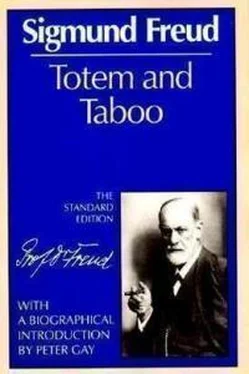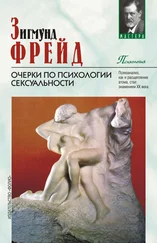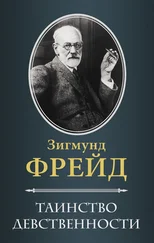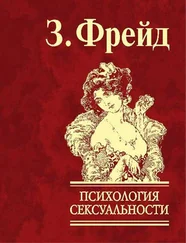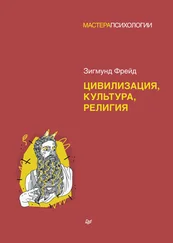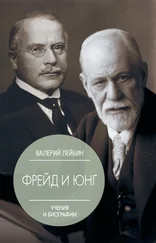Зигмунд Фрейд - Totem and Taboo
Здесь есть возможность читать онлайн «Зигмунд Фрейд - Totem and Taboo» весь текст электронной книги совершенно бесплатно (целиком полную версию без сокращений). В некоторых случаях можно слушать аудио, скачать через торрент в формате fb2 и присутствует краткое содержание. Год выпуска: 2014, Издательство: epubBooks Classics, Жанр: Психология, на английском языке. Описание произведения, (предисловие) а так же отзывы посетителей доступны на портале библиотеки ЛибКат.
- Название:Totem and Taboo
- Автор:
- Издательство:epubBooks Classics
- Жанр:
- Год:2014
- ISBN:нет данных
- Рейтинг книги:3 / 5. Голосов: 1
-
Избранное:Добавить в избранное
- Отзывы:
-
Ваша оценка:
- 60
- 1
- 2
- 3
- 4
- 5
Totem and Taboo: краткое содержание, описание и аннотация
Предлагаем к чтению аннотацию, описание, краткое содержание или предисловие (зависит от того, что написал сам автор книги «Totem and Taboo»). Если вы не нашли необходимую информацию о книге — напишите в комментариях, мы постараемся отыскать её.
Totem and Taboo — читать онлайн бесплатно полную книгу (весь текст) целиком
Ниже представлен текст книги, разбитый по страницам. Система сохранения места последней прочитанной страницы, позволяет с удобством читать онлайн бесплатно книгу «Totem and Taboo», без необходимости каждый раз заново искать на чём Вы остановились. Поставьте закладку, и сможете в любой момент перейти на страницу, на которой закончили чтение.
Интервал:
Закладка:
When Christianity began its entry into the ancient world it met with the competition of the religion of Mithras and for a long time it was doubtful which deity was to be the victor.
The bright figure of the youthful Persian god has eluded our understanding. Perhaps we may conclude from the illustrations of Mithras slaying the steers that he represented the son who carried out the sacrifice of the father by himself and thus released the brothers from their oppressing complicity in the deed. There was another way of allaying this sense of guilt and this is the one that Christ took. He sacrificed his own life and thereby redeemed the brothers from primal sin.
The theory of primal sin is of Orphic origin; it was preserved in the mysteries and thence penetrated into the philosophic schools of Greek antiquity [221] Reinach, Cultes, Mythes, et Religions , II, p. 75.
. Men were the descendants of Titans, who had killed and dismembered the young Dionysos–Zagreus; the weight of this crime oppressed them. A fragment of Anaximander says that the unity of the world was destroyed by a primordial crime and everything that issued from it must carry on the punishment for this crime [222] “Une sorte de péché proethnique,” l.c. , p. 76.
. Although the features of banding together, killing, and dismembering as expressed in the deed of the Titans very clearly recall the totem sacrifice described by St Nilus—as also many other myths of antiquity, for example, the death of Orpheus himself—we are nevertheless disturbed here by the variation according to which a youthful god was murdered.
In the Christian myth man’s original sin is undoubtedly an offence against God the Father, and if Christ redeems mankind from the weight of original sin by sacrificing his own life, he forces us to the conclusion that this sin was murder. According to the law of retaliation which is deeply rooted in human feeling, a murder can be atoned only by the sacrifice of another life; the self–sacrifice points to a blood–guilt [223] The suicidal impulses of our neurotics regularly prove to be self–punishments for death wishes directed against others.
. And if this sacrifice of one’s own life brings about a reconciliation with god, the father, then the crime which must be expiated can only have been the murder of the father.
Thus in the Christian doctrine mankind most unreservedly acknowledges the guilty deed of primordial times because it now has found the most complete expiation for this deed in the sacrificial death of the son. The reconciliation with the father is the more thorough because simultaneously with this sacrifice there follows the complete renunciation of woman, for whose sake mankind rebelled against the father. But now also the psychological fatality of ambivalence demands its rights. In the same deed which offers the greatest possible expiation to the father, the son also attains the goal of his wishes against the father. He becomes a god himself beside or rather in place of his father. The religion of the son succeeds the religion of the father. As a sign of this substitution the old totem feast is revived again in the form of communion in which the band of brothers now eats the flesh and blood of the son and no longer that of the father, the sons thereby identifying themselves with him and becoming holy themselves. Thus through the ages we see the identity of the totem feast with the animal sacrifice, the theanthropic human sacrifice, and the Christian eucharist, and in all these solemn occasions we recognize the after–effects of that crime which so oppressed men but of which they must have been so proud. At bottom, however, the Christian communion is a new setting aside of the father, a repetition of the crime that must be expiated. We see how well justified is Frazer’s dictum that “the Christian communion has absorbed within itself a sacrament which is doubtless far older than Christianity” [224] Eating the God , p. 51…. Nobody familiar with the literature on this subject will assume that the tracing back of the Christian communion to the totem feast is an idea of the author of this book.
.
A process like the removal of the primal father by the band of brothers must have left ineradicable traces in the history of mankind and must have expressed itself the more frequently in numerous substitutive formations the less it itself was to be remembered. [225] Ariel in The Tempest : Full fathom five thy father lies; Of his bones are coral made; Those are pearls that were his eyes; Nothing of him that doth fade But doth suffer a sea–change Into something rich and strange….
I am avoiding the temptation of pointing out these traces in mythology, where they are not hard to find, and am turning to another field in following a hint of S. Reinach in his suggestive treatment of the death of Orpheus [226] La Mort d’Orphée, Cultes, Mythes, et Religions , Vol. II, p. 100.
.
There is a situation in the history of Greek art which is strikingly familiar even if profoundly divergent, to the scene of a totem feast discovered by Robertson Smith. It is the situation of the oldest Greek tragedy. A group of persons, all of the same name and dressed in the same way, surround a single figure upon whose words and actions they are dependent, to represent the chorus and the original single impersonator of the hero. Later developments created a second and a third actor in order to represent opponents in playing, and off–shoots of the hero, but the character of the hero as well as his relation to the chorus remains unchanged. The hero of the tragedy had to suffer; this is to–day still the essential content of a tragedy. He had taken upon himself the so–called ‘tragic guilt’, which is not always easy to explain; it is often not a guilt in the ordinary sense. Almost always it consisted of a rebellion against a divine or human authority and the chorus accompanied the hero with their sympathies, trying to restrain and warn him, and lamented his fate after he had met with what was considered fitting punishment for his daring attempt.
But why did the hero of the tragedy have to suffer, and what was the meaning of his ‘tragic’ guilt? We will cut short the discussion by a prompt answer. He had to suffer because he was the primal father, the hero of that primordial tragedy the repetition of which here serves a certain tendency, and the tragic guilt is the guilt which he had to take upon himself in order to free the chorus of theirs. The scene upon the stage came into being through purposive distortion of the historical scene or, one is tempted to say, it was the result of refined hypocrisy. Actually, in the old situation, it was the members of the chorus themselves who had caused the suffering of the hero; here, on the other hand, they exhaust themselves in sympathy and regret, and the hero himself is to blame for his suffering. The crime foisted upon him, namely, presumption and rebellion against a great authority, is the same as that which in the past oppressed the colleagues of the chorus, namely, the band of brothers. Thus the tragic hero, though still against his will, is made the redeemer of the chorus.
When one bears in mind the suffering of the divine goat Dionysos in the performance of the Greek tragedy and the lament of the retinue of goats who identified themselves with him, one can easily understand how the almost extinct drama was reviewed in the Middle Ages in the Passion of Christ.
In closing this study, which has been carried out in extremely condensed form, I want to state the conclusion that the beginnings of religion, ethics, society, and art meet in the Oedipus complex. This is in entire accord with the findings of psychoanalysis, namely, that the nucleus of all neuroses as far as our present knowledge of them goes is the Oedipus complex. It comes as a great surprise to me that these problems of racial psychology can also be solved through a single concrete instance, such as the relation to the father. Perhaps another psychological problem must be included here. We have so frequently had occasion to show the ambivalence of emotions in its real sense, that is to say the coincidence of love and hate towards the same object, at the root of important cultural formations. We know nothing about the origin of this ambivalence. It may be assumed to be a fundamental phenomenon of our emotional life. But the other possibility seems to me also worthy of consideration: that ambivalence, originally foreign to our emotional life was acquired by mankind from the father complex [227] That is to say, the parent complex.
, where psychoanalytic investigation of the individual to–day still reveals the strongest expression of it [228] I am used to being misunderstood and therefore do not think it superfluous to state clearly that in giving these deductions I am by no means oblivious of the complex nature of the phenomena which give rise to them; the only claim made is that a new factor has been added to the already known or still unrecognized origins of religion, morality, and society, which was furnished through psychoanalytic experience. The synthesis of the whole explanation must be left to another. But it is in the nature of this new contribution that it could play none other than the central rôle in such a synthesis, although it will be necessary to overcome great affective resistances before such importance will be conceded to it.
.
Интервал:
Закладка:
Похожие книги на «Totem and Taboo»
Представляем Вашему вниманию похожие книги на «Totem and Taboo» списком для выбора. Мы отобрали схожую по названию и смыслу литературу в надежде предоставить читателям больше вариантов отыскать новые, интересные, ещё непрочитанные произведения.
Обсуждение, отзывы о книге «Totem and Taboo» и просто собственные мнения читателей. Оставьте ваши комментарии, напишите, что Вы думаете о произведении, его смысле или главных героях. Укажите что конкретно понравилось, а что нет, и почему Вы так считаете.
